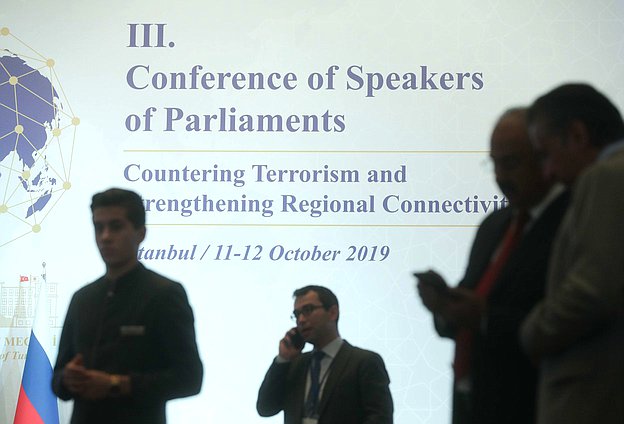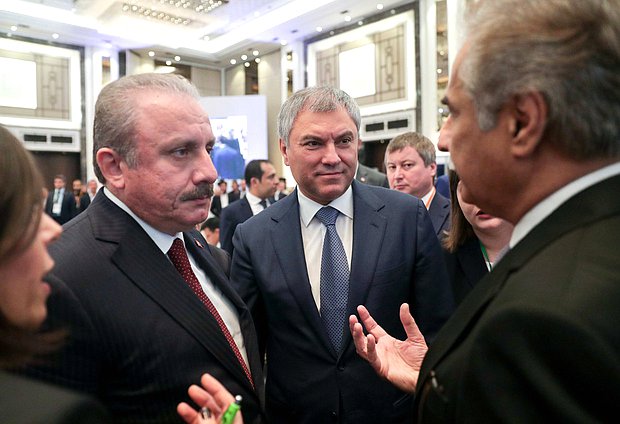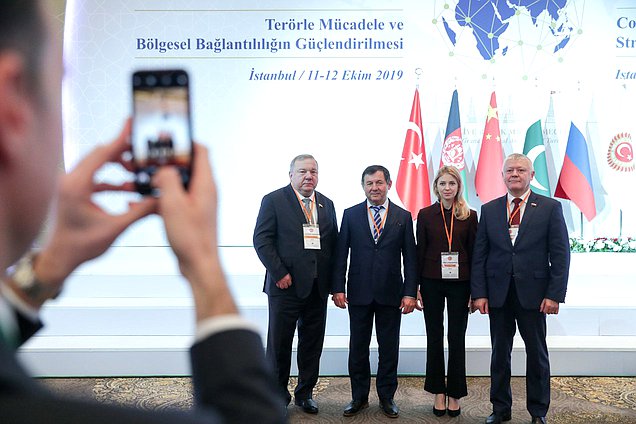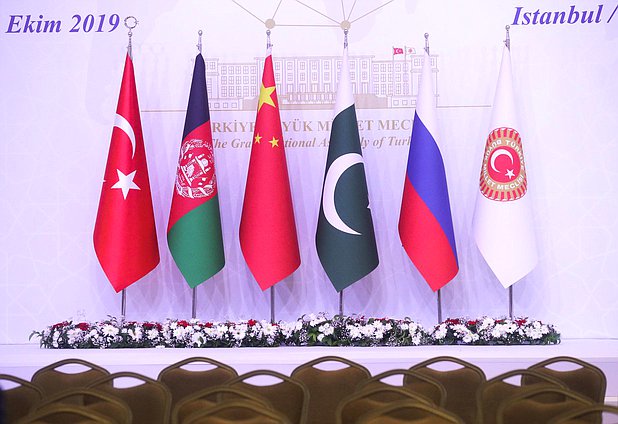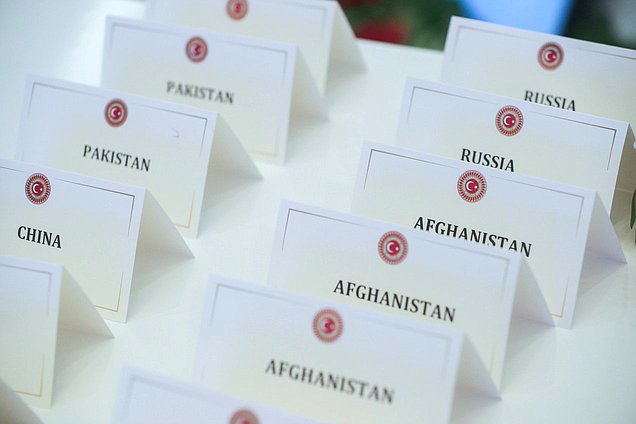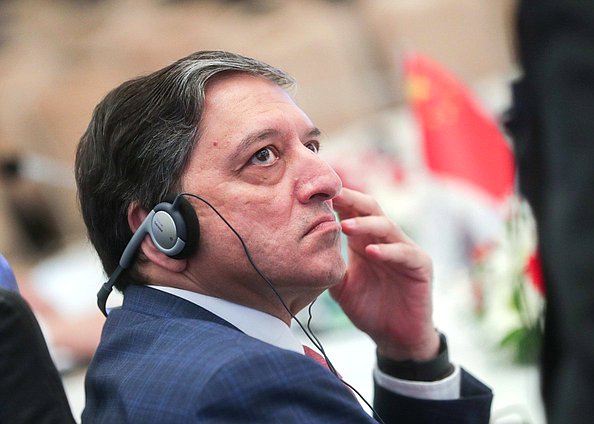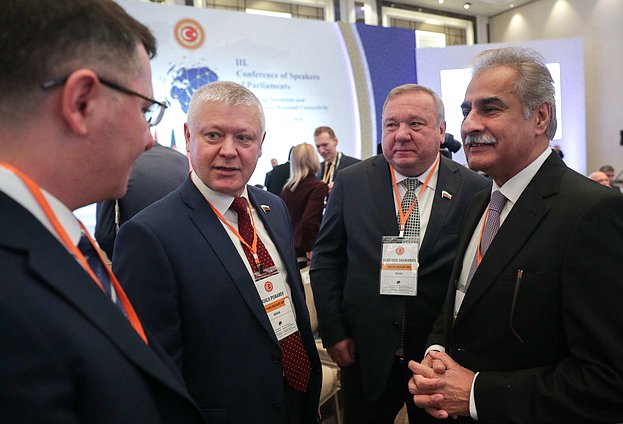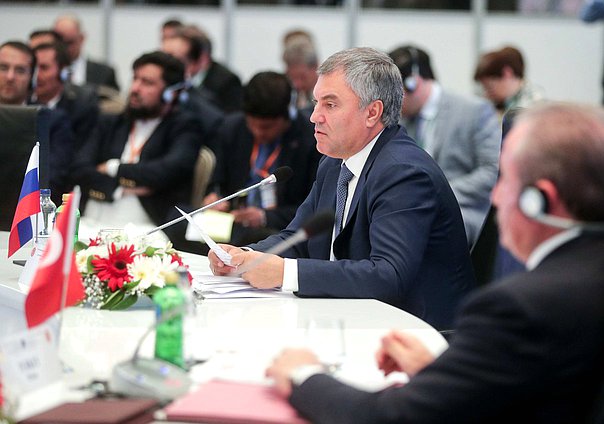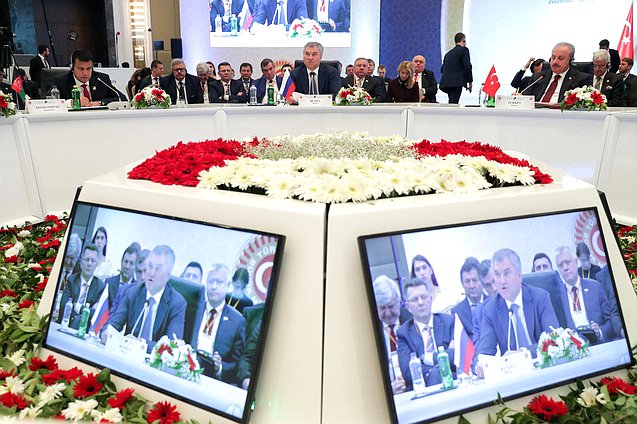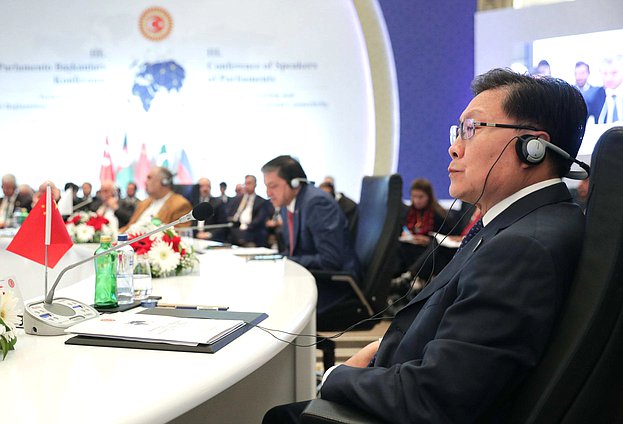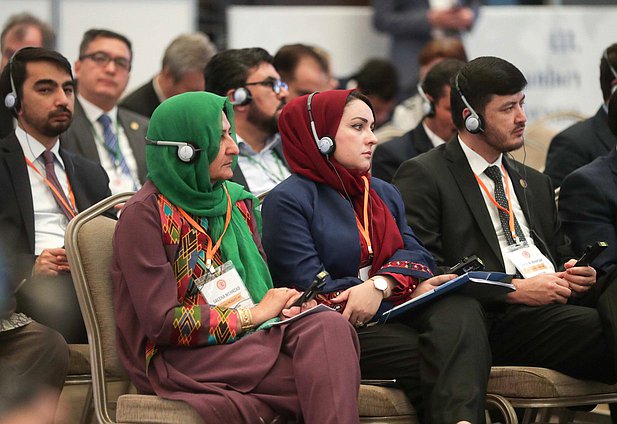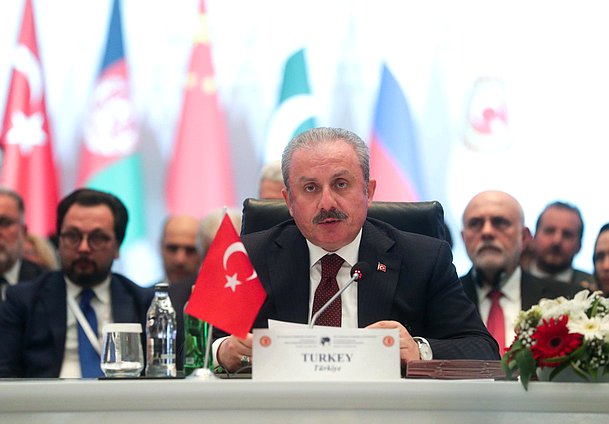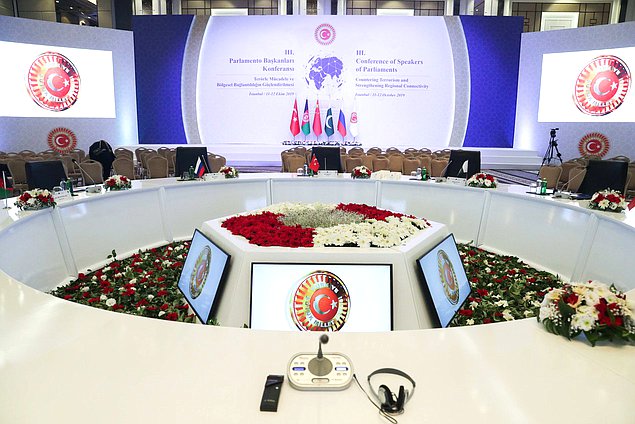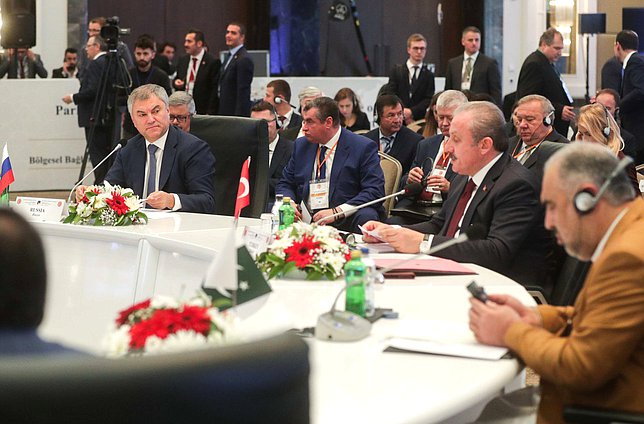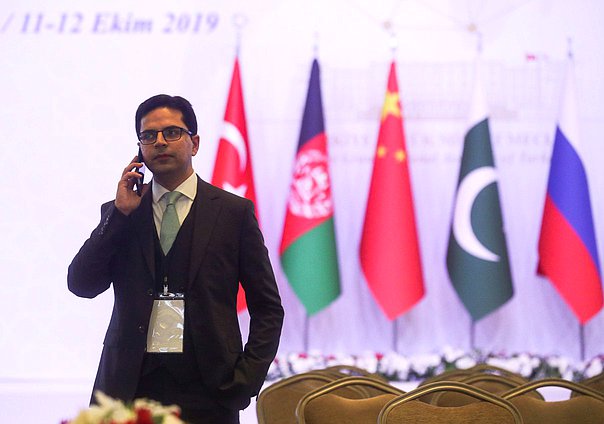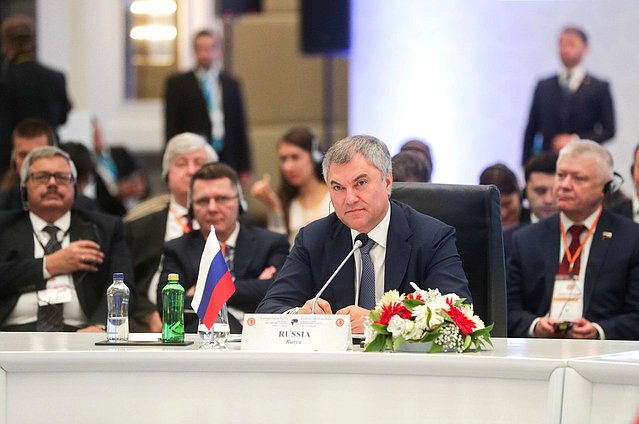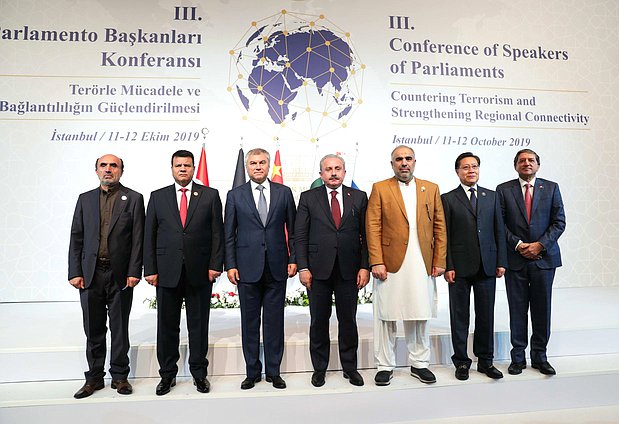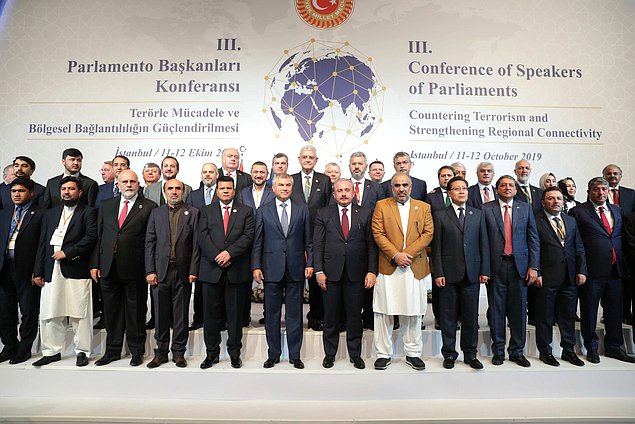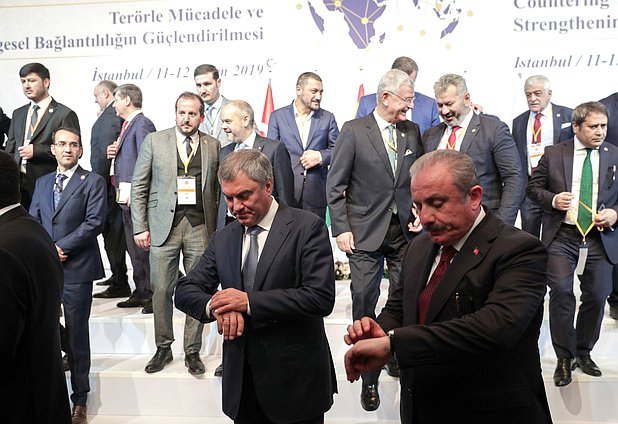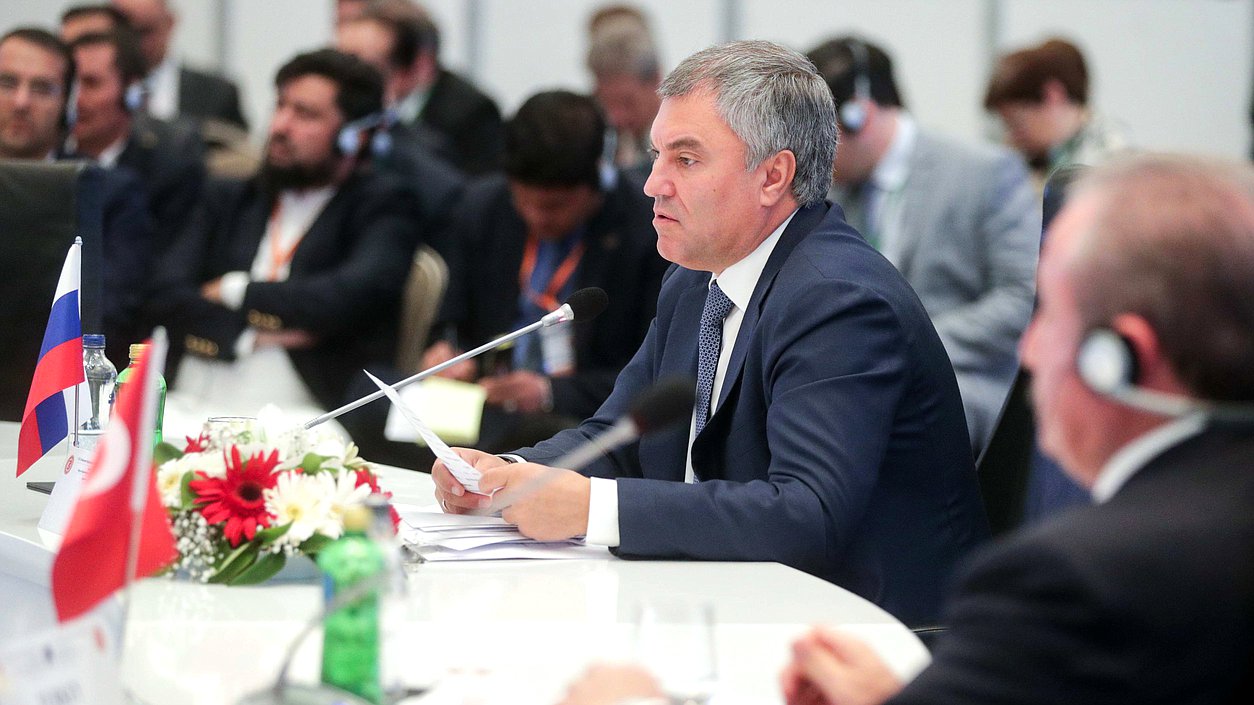
Dear colleagues!
Today, we are working at the annual Conference of Speakers of the Parliaments on Countering Terrorism and Strengthening Regional Connectivity or the third time.
It should be recognized that the format, that we first implemented in Islamabad, has shown its efficiency, and in this regard, I want to express my gratitude to those of our colleagues who are not here today, time goes by, and some of our colleagues have already retired, some of them are engaged in other activities or hold other positions.
We are talking about Mr. Ismail Kahraman, Mr.Sardar Sadiq and Mr. Abdul Rauf Ibrahimi, the speakers of the parliaments of Turkey, Pakistan and Afghanistan.
These are the people who had supported this format at the time, politicians, who understood their responsibility to their nationals, initiated a conversation. And today, for the third time, we are discussing this topic, which is important for all of us, with understanding that we, first of all, with a help of dialogue need to get trust and understanding of importance of the problems and challenges that our countries are facing, and only together, collectively we should seek solutions.
The issue of the fight against international terrorism is relevant not only for our states, as I think, you will agree with this. Therefore, we must enhance our cooperation, engaging more and more countries in the dialogue, our colleagues from the parliaments of other states to address this global challenge together.
Today, international terrorists are spreading their presence to North, West and Central Africa, South and Southeast Asia, and are preparing for expansion in Central Asia and Europe.
Therefore, it is more important than ever to unite against terrorism.
Dear colleagues!
The most important condition for the effective fight against terrorism is the formation of a unified legal space. We should not only make it a priority, but also reach specific decisions, developing proposals in this area. And in this regard, a major role is given to the interaction of parliaments, the exchange of experience, and best decision-making practices.
It is unacceptable when terrorist organizations banned in some states perform freely their activities in others. Terrorists take advantage of it to avoid responsibility.
It is important to create legal conditions when the supply of terrorist groups with weapons, material, financial and human resources is impossible.
An integrated strategy is needed to prevent financial support of terrorists through drug trafficking. It is extremely important to hold negotiations on this issue, especially, when our colleagues from Afghanistan, Pakistan are now here, and, of course, in the future, we would like to expand the format of participants, to [increase] representation of those states that are really interested in this, taking inti account that they have borders with the Republic of Afghanistan and are primarily affected by drug dealers.
According to the UN, the annual transfers of heroin and opiates from Afghanistan along the northern route to Central Asia and Russia are estimated at an average of about 55 tons. And I want to draw attention to this, this is just 1% of identified transfers.
We should create together a legislative basis to counter also the advocacy of terrorism and extremism, including in the information space.
In order to effectively address this issue, it is important to rely on common international standards based on the recognition of the central role of the state and its competent authorities. And most importantly, the condemnation of terrorism in all its forms and manifestations.
This approach was supported by the G20 leaders in Osaka this June in a statement on preventing exploitation of the Internet for terrorism and extremism.
It is also necessary to develop parliamentary recommendations on the issue of informing about the facts of detention of persons suspected of involvement in the activities of illegal armed groups.
We need to legislatively provide the security services and law enforcement agencies of our countries all the opportunities to control the movement of foreign terrorist fighters. We should take into account the fact that after the completion of the anti-terrorist operation in Syria, the militants began to return to their countries or take refuge in other countries.
This will be our real contribution, as well as of international parliamentary organizations, in the fight against terrorism.
Such work on the harmonization of national legislation is carried out in the CSTO Parliamentary Assembly. And I would like to say a few words about this, and there are specific examples as we can achieve positive results within the parliamentary dimension.
One of the concrete steps in this work is the model Law approved by the CSTO PA ”On informational counteraction to terrorism and extremism“, which adrresses the issue of countering the ideas of terrorism and extremism in the information space, reinforcing the security of citizens of our countries.
I will also note the recommendations adopted by the CSTO PA on the recognition of organizations as terrorist. The basis for the formation of a single list of such organizations has been created. In this regard, we would use experience of the CSTO PA, among the states that are included in this structure, including through our conference and the countries participating in this format. So the single list of terrorist organizations would be supported by the decisions of our countries, and thus for terrorists would be less opportunities to operate with impunity and use legal loopholes to avoid responsibility.
In June 2017, member states of the Shanghai Cooperation Organization approved the SCO Convention on countering extremism, which includes collective approaches to counter terrorism.
Russia, as well as China, Tajikistan, Kyrgyzstan and Uzbekistan, has ratified the Convention. It is open for signature even to not SCO member states.
In the course of the upcoming Russian SCO presidency next year, we plan to hold the first meeting of speakers of the parliaments of the member states of the Organization. We also invite you to participate and exchange opinions within this respected structure.
And, of course, issues of legislative support for the fight against terrorism and strengthening regional cooperation will be a priority for us.
Colleagues, I suggest to think about creating an ad hoc working group with the participation of specified committees of our parliaments so that we begin to take concrete steps, and from dialogue, from a common understanding that these are the challenges that our countries face, we need to make a concrete contribution to this fight by working on legislation. And, perhaps, thus we could develop model solutions that then will be used by our countries.
We need to accelerate practical cooperation in the field of harmonization of counter-terrorism legislation.
Dear colleagues!
The development and competitiveness of our countries and the implementation of integration projects in Greater Eurasia largely depend on how efficiently we resolve security issues.
When we talk about modern threats, it is not only about countering terrorism, extremism, drug crime, and illegal migration.
A common challenge for the Eurasian countries and the entire emerging multipolar world is the intensification of attempts to interfere in the internal affairs of sovereign states. Let’s admit that today it has become a scourge, and we cannot pretend that it does not exist and not give it an assessment.
Crises and revolutions created as a result of interference in the affairs of states threaten statehood and the historical continuity of nations. Only strong sovereign states are capable of successful resistance to the challenges of international terrorism and extremist ideologies. Dear colleagues, we need to accept this and adhere to this approach only. If only a strong sovereign state is destroyed, this is the path to the development of extremist ideologies, this is the basis for terrorist organizations to begin to settle on the territory of this state. We must give priority to strengthening the sovereignty of states, respecting the traditions of these countries, its history, and culture. Only on this basis can we effectively deal with the challenges that humanity faces today.
Today we must also take into account that in modern realities, to cause damage to a state, citizens, organizations, it is often not necessary to invade its territory.
Digital technologies make it possible to intervene in the internal affairs of states, election campaigns, and the work of the energy, transport, and financial systems from outside.
Therefore, it is extremely important to ensure the digital sovereignty of our states, to protect the rights of people in cyberspace, their personal data in the first place. This is a prerequisite for the safe use of Internet technologies and artificial intelligence in the interests of the development of our countries.
It would also be right to jointly develop effective legislative solutions that, on the one hand, will strengthen regional cooperation in the field of high technology implementation. Just last week, we discussed this issue with the Chairman of the Chinese Parliament and came to a decision that will allow us, on the one hand, to work in these areas, and on the other hand, to resist external challenges, interference via the use of Internet technologies, and the capabilities of the digital economy.
Within the framework of our conference, it would also be right for us to work out proposals that we then realize by structuring our work in order to make a concrete contribution to the development of legislation in these areas, which could create the basis for more effective work, countering extremism, terrorism, and drug trafficking. We must unite our countries so that we really do not provide possibilities and loopholes for those who want to use these modern technologies to destroy the world and pursue an extremist ideology.
Dear colleagues!
I consider it important to focus our activity on these priority areas of multilateral regional cooperation within the parliamentary dimension.
And once again I propose to think about how, in the future, within the framework of our conference, to improve efficiency and, most importantly, contribute to countering the today’s evils such terrorism and extremist ideologies that are spreading around the world by, on the one hand, expanding the format of participants, on the other, structuring the work on key issues that we have already identified. We must better understand each other in matters that should unite us. Only by joining forces can we work more efficiently and develop proposals for solving key problems.
Thank you for your attention.
